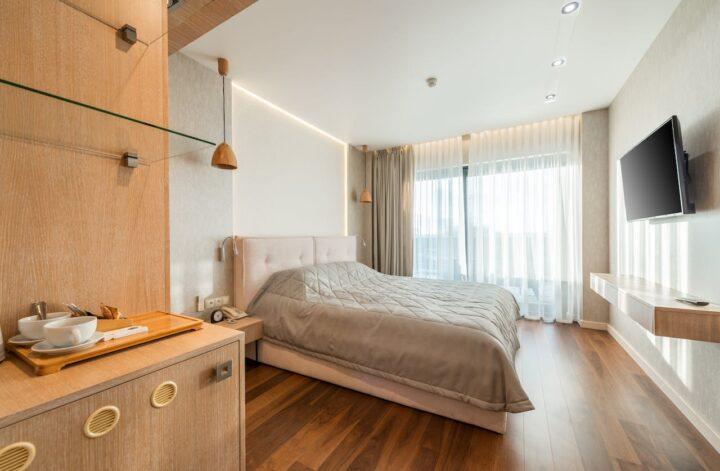As we step into a transformative era for the hospitality industry, the future of hotel room selling is poised to undergo significant changes. In an increasingly competitive market, adopting an integrated hotel marketing approach becomes essential, blending traditional and digital strategies to create a seamless guest experience. In this article, we’ll explore emerging developments. These include the growing preference for living in a hotel vs. an apartment and the crucial role of engaging employees and collecting their feedback. All these forecast a dynamic, customer-focused future in hotel room selling, adapting to evolving consumer demands and technological advancements.
1. Personalization
One of the most significant trends is the move towards highly personalized guest experiences. Hotels are increasingly curating their offerings to match individual preferences. This might include customized room settings, tailor-fit dining options, and activities aligned with their interests. By understanding and anticipating the needs of each customer, establishments can create memorable, unique experiences that encourage loyalty and repeat business.
2. Leveraging Technology
The incorporation of cutting-edge technology is set to revolutionize the guest experience. This encompasses the use of AI for personalized recommendations, VR for virtual tours of hotel rooms and amenities, and IoT for enhancing room comfort through smart devices. Mobile platforms are becoming the central hub for check-ins and room service, even serving as digital keys. Contactless technology, accelerated by the COVID-19 pandemic, is expected to become the norm, offering guests a seamless and safe experience.
3. Sustainable Practices
Sustainability is no longer a buzzword but an imperative. Guests are increasingly becoming conscious of their carbon footprint, leading to a preference for hotels that demonstrate eco-conscious practices. This includes tapping into energy-efficient operations, reducing waste, and sourcing food and materials locally. Hotels that adopt and promote green practices will not only contribute to environmental preservation but also attract a growing segment of conservation-minded travelers.
4. Experience Over Accommodation
The future of hotel room selling is shifting from selling a room to selling an experience. This trend sees hotels offering unique, local experiences, such as cultural tours, wellness retreats, and culinary adventures. Hotels are becoming destinations in themselves, offering moments that cannot be replicated elsewhere, thus distinguishing themselves in a saturated market.
5. The Rise of the “Bleisure” Traveler
The mix of business and leisure travel, known as ‘bleisure’, is another popular trend. Business travelers are extending their stays to have more fun and enjoyment. As a result, hotels are adapting by offering facilities and services that cater to both work and play. This includes flexible workspaces, high-speed internet, extravagant amenities, and tailored experiences that allow guests to savor the best of both worlds.
6. Increasing Preference for Hotels over Apartment
An intriguing trend is the growing preference for long-term hotel stays over traditional apartment rentals. This shift is driven by the desire for flexibility, convenience, and access to hotel amenities. Hotels are responding by offering extended stay packages with home-like comforts and services, such as kitchenettes, laundry services, and regular housekeeping.
7. Expanding Importance of Employee Engagement
Employees are the heart of any hospitality business. Engaging them and ensuring their satisfaction is crucial for delivering exceptional guest service. Hotels are focusing on training programs, career development opportunities, and employee wellness initiatives. Additionally, gathering and acting upon employee feedback is vital for improving service quality and proactively addressing any issues.
8. Leveraging Social Media and Influencer Marketing
Social media has become an indispensable tool for hotel marketing. Hotels are using platforms like Instagram and TikTok to showcase their properties and experiences, reaching a broader audience. Influencer collaborations are also on the rise, tapping into their followers for broader exposure and credibility.
9. Data-Driven Decision Making
In today’s world of big data, making informed decisions based on analytics is vital. Hotels are using data to understand market trends, guest preferences, and operational efficiencies. This data-driven approach allows for targeted marketing strategies, personalized guest experiences, and improved operational decisions.
10. Crisis Management and Preparedness
The recent pandemic highlighted the importance of crisis management in the hospitality industry. Hotels must be prepared for unexpected events with flexible cancellation policies, rigorous health and safety protocols, and clear communication strategies. This preparedness not only helps in managing the immediate crisis but also builds trust and confidence among guests.
The Bottom Line
The future of hotel room selling is dynamic and multifaceted, driven by technological advancements, a shift in consumer preferences, and a focus on personalized and unique experiences. By embracing these trends and predictions, hotels can stay ahead of the curve, offering guests not just a place to stay but an experience to remember. This shift requires a comprehensive strategy, combining technological innovations, sustainable practices, and a deep understanding of guest needs and preferences. As the industry evolves, those who can rapidly adapt will thrive in the dynamic and competitive landscape of hotel room selling.
Article by Chatty Garrate




